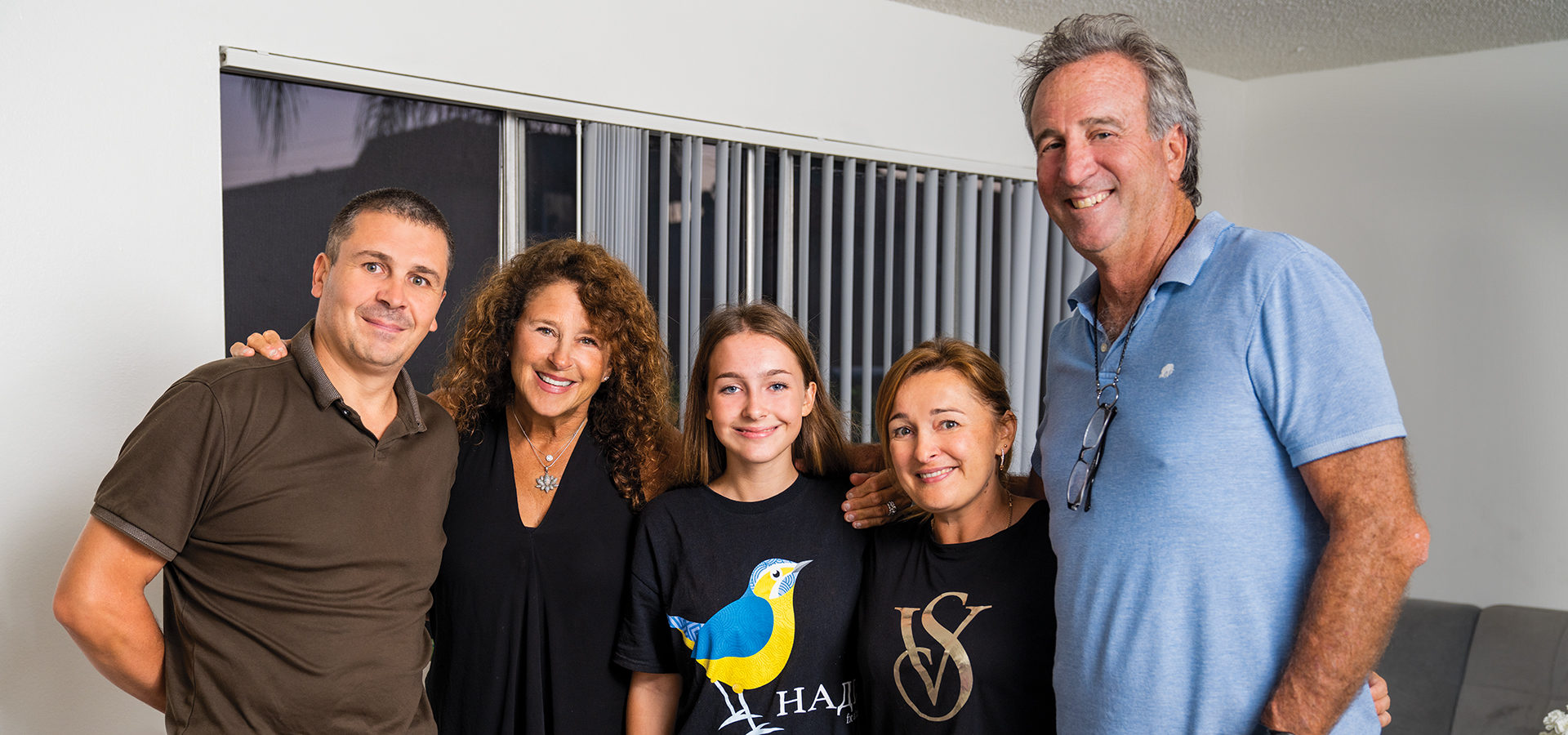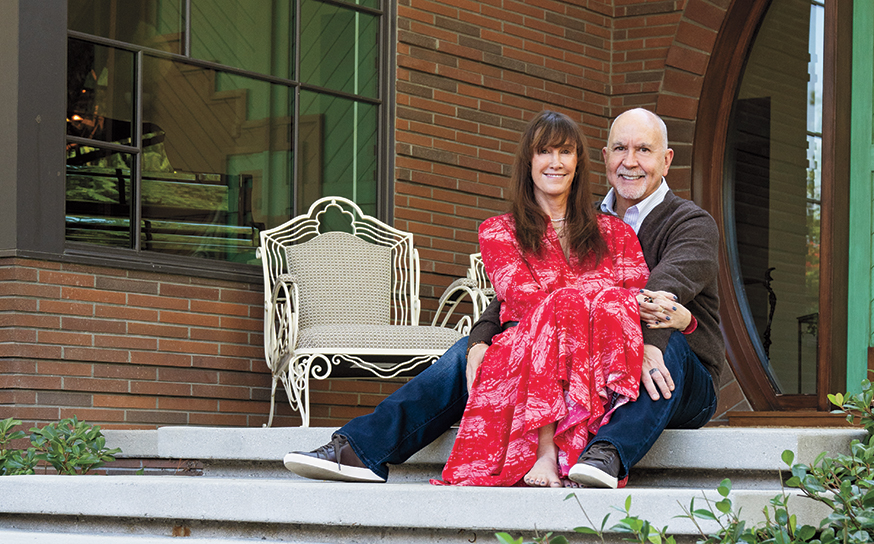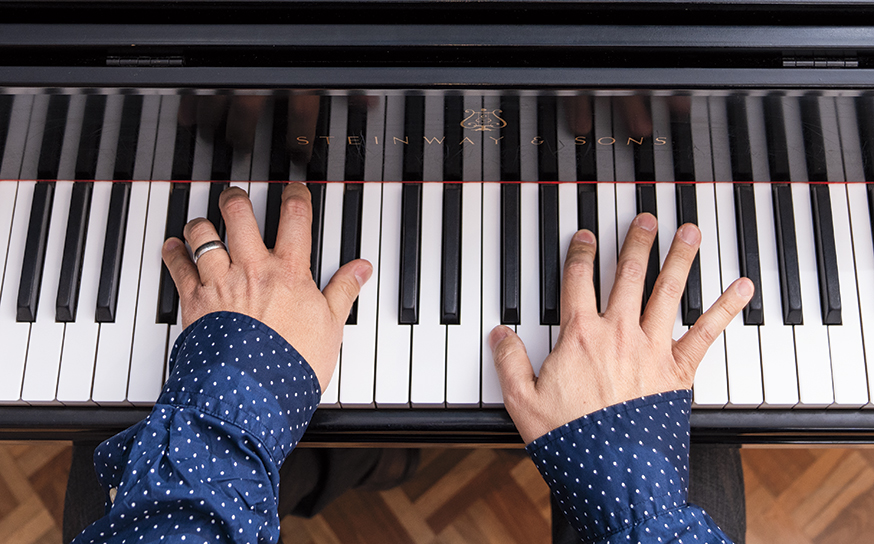A Valley Couple Hosts a Ukrainian Refugee Family
Circle of love.
-
CategoryPeople
-
Written byAnne M. Russell
-
Photographed byShane O’Donnell
-
AboveMatt and Jane visiting the family at their new apartment in Huntington Beach
Dasha, a 14-year-old girl from the suburbs of Kyiv, has a single word to describe her journey from her Ukrainian homeland to the United States: “terrible.”
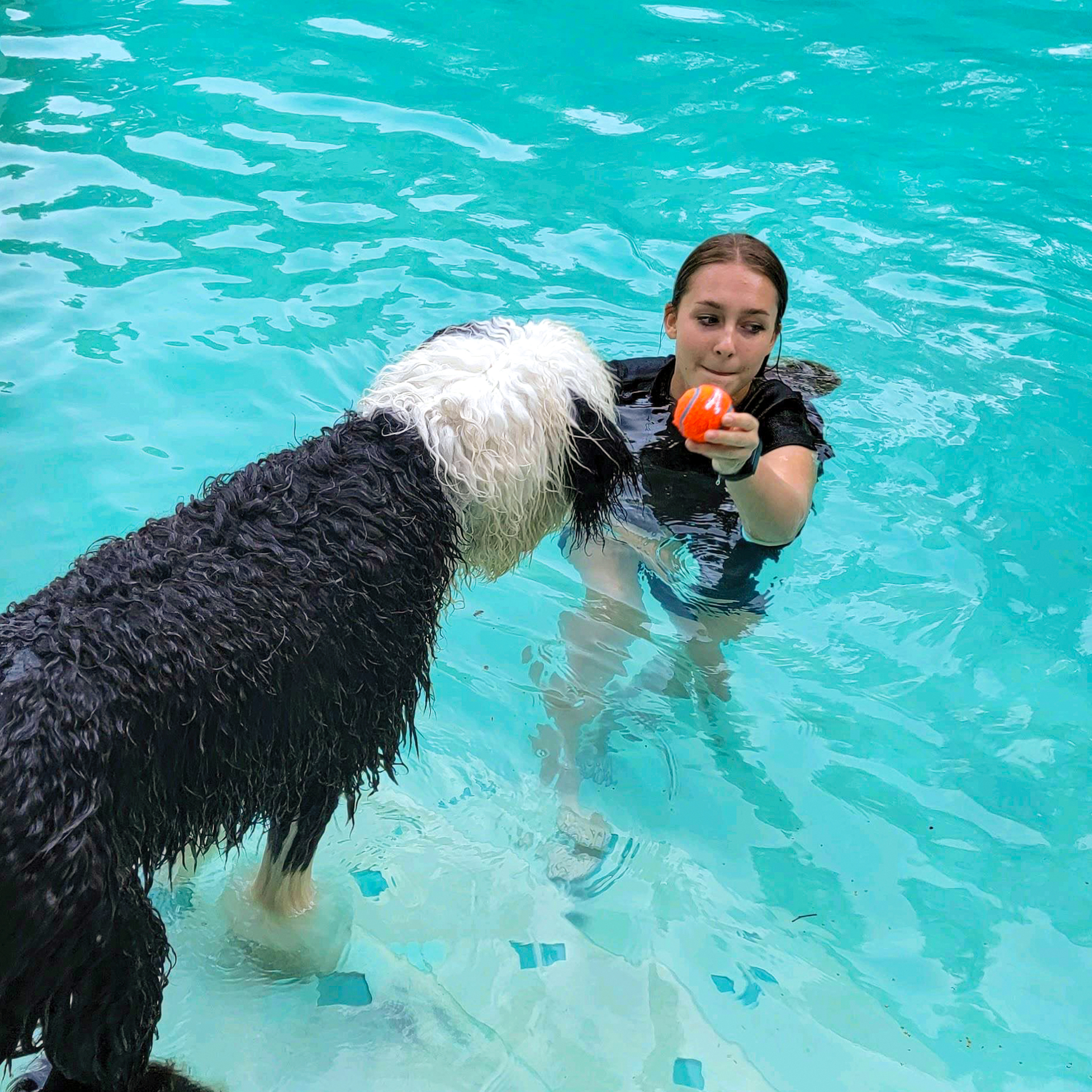
Dasha playing with dog Lucy in Sherman Oaks
Her family’s flight from their home in Ukraine began this past winter, she says, when her father, Vadim, “heard the first sounds of war the very first morning at 6 a.m. We decided to move to our grandma’s house. She lives about 250 miles from Kyiv.”
Dasha, Vadim, her mother, Tanya, and the family dog, Ritchie, began their journey by car. (The family asked that their last name not be used for safety reasons.) After leaving the dog with Dasha’s grandmother, the family drove into neighboring Moldova and later to the Czech Republic. They felt, however, that the Czech Republic “was not the safest of places because of the aggression of Russia,” Dasha says. “My mom said we should try to go to the U.S.”
“There’s no owner’s manual on how to host a family. So we reached out on social media. The South Valley really came through—there was an outpouring of love and support.”
The family left Prague in late April, driving to Vienna and then taking a flight to Madrid, and then to Mexico, which they could enter without a visa. From Mexico City, they needed to catch a short-hop flight to Tijuana, the final stop before attempting the border crossing into the U.S. Dasha, Vadim and Tanya had been traveling for four mostly sleepless days when they were told by a Mexican airline representative that each ticket to Tijuana would be $4,000.

Reversing the Tide
Fortunately, a Spanish-speaking Ukrainian volunteer who had met the family at the airport in Mexico City interceded on their behalf, “with a lot of arguing in Spanish,” Dasha recalls. After the price dropped to $200 per ticket, the family was on their way, arriving in Tijuana just weeks before the border was closed to Ukrainian refugees.
That lucky break in timing led to another: The pairing of Dasha’s family with Sherman Oaks residents Jane Kaplan and her husband, Matt Epstein, a local realtor who is president of the Sherman Oaks Homeowners Association. Jane and Matt were keenly aware of the plight of the refugees and wanted to find a way to help.
“It was a big decision,” says Matt, “but an easy one after what we saw on TV.” Knowing that they had an empty two-bedroom guest house on their spacious property in Sherman Oaks—and that neither of their two adult children were home—“We felt like, how could we not?” says Jane. As real estate professionals (Jane and Matt work together), both felt that the flexibility in their work schedules would allow them to be available to help the family as needed.
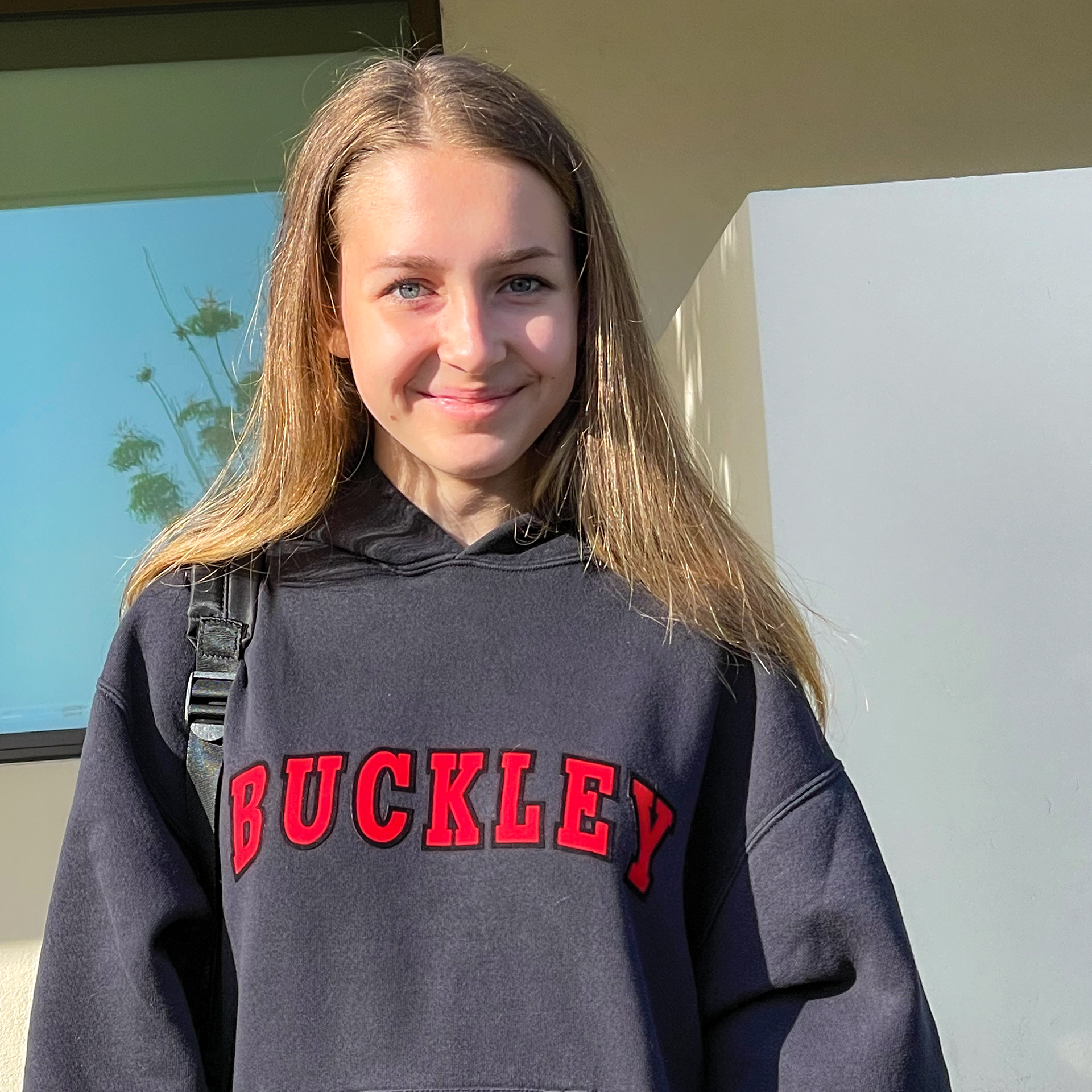
Making Connection
But actually extending that help wasn’t easy. Early in the war, there were few organized efforts to place the millions of Ukrainians fleeing their country—6.8 million to date; Poland alone has accommodated 2 million.
Jane began her quest by calling the Ukrainian embassy and religious groups that she thought might be sponsoring refugees, but got nowhere. She eventually connected with a woman in Beverly Hills who was hosting a family. That led to a contact with Ukrainian American volunteers at the Mexican border and a surprise call asking Matt and Jane to drive down to Irvine that same day to pick up a family that had just crossed into the U.S.—Dasha’s family, as it turned out.
Once the family arrived, the couple worked to set them up with supplies. “There’s no owner’s manual on how to host a family,” says Matt. “So we reached out on social media. The South Valley really came through—there was an outpouring of love and support.” The couple says they were offered lots of clothes and household goods—more than they needed.
Although both Vadim and Tanya hold advanced degrees—Tanya was a law professor at Kyiv University—neither speaks English, and they needed help navigating the complexities of American social services. “So we started orchestrating a plan for them to do well here,” says Jane.

Settling In
The family arrived well prepared with the personal documents they needed, such as birth certificates and passports. Within 48 hours of Jane’s visiting the California Department of Social Services with the family, they were able to secure medical coverage, food assistance, and a monthly stipend, all funded by the federal government. Ukrainians fleeing the war are being admitted to the U.S. under a status known as “humanitarian parole,” which is good for only three years and prohibits employment without special authorization. It also leads to the occasional use of the confusing and stigmatizing description of Ukrainian refugees as “parolees.” This temporary status is different from that of asylum seekers and is not a conduit to U.S. citizenship.
Although school was almost out for summer, Matt reached out to The Buckley School, a private K-12 institution in Sherman Oaks. He asked if they’d admit Dasha for the remaining three weeks. “The school stepped right up to the plate,” says Jane. “They wanted to give her a safe landing place.” Buckley even provided Dasha with the required uniforms.
Talking to Matt and Jane, it’s clear that they really enjoyed having a kid around again. They delighted in watching Dasha play in the pool and with their sheepadoodle, Lucy. And the feeling is reciprocated. “Matt and Jane are really good people,” shares Dasha. “I really enjoyed being at their place.”
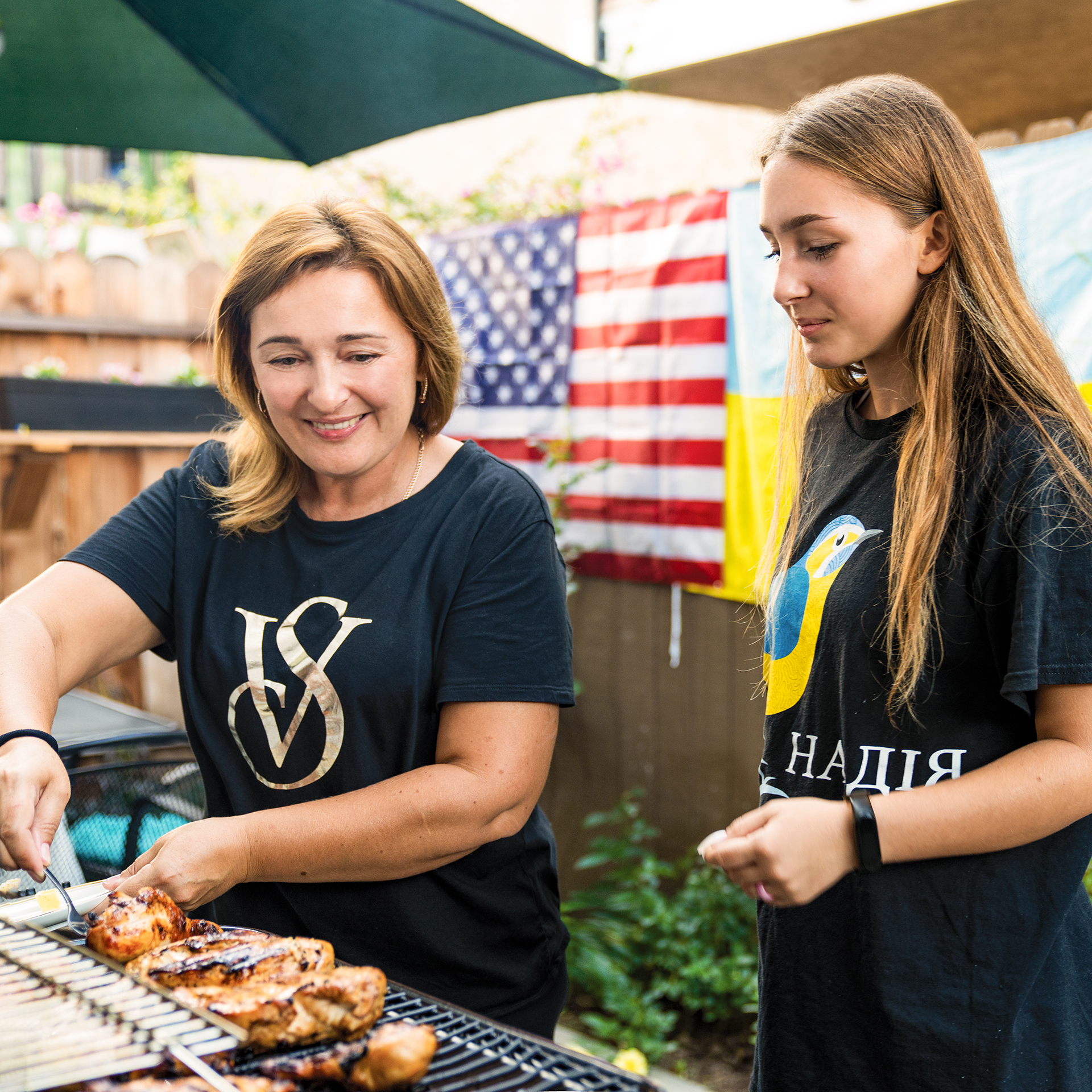
Tanya preparing dinner for the couple’s visit
They all recently reunited at the Ukrainian family’s Huntington Beach apartment, which is being provided to them gratis by its Ukrainian American owner. Tanya made dinner; Dasha played with Lucy, who came along for the visit.
Although Dasha is settling into SoCal life remarkably quickly, attending a local public school and spending most weekends at the beach, she is wistful about her homeland. “I miss my dog, my friends and my school,” she adds. “And I miss my city: There I was confident; I knew every street.” And as the war intensifies, she’s worried for loved ones who stayed behind.
Jane and Matt say they treasure the three months Dasha and her family spent with them and that they’d love to host another Ukrainian family. “We’re talking about it right now,” says Jane, even as the backlog of Ukrainians seeking admission grows.
Tip Sheet: If You’d Like to Help
- In April, the Department of Homeland Security kicked off Uniting for Ukraine (U4U) to match Ukrainian refugees with American families willing to sponsor them. For more go to: ukraine.welcome.us/connect.
- The commitment of a sponsor is to provide the newcomers with financial assistance and help navigating the social services maze. The U4U program encourages sponsors to crowdsource financial and social support, either through organizations such as church groups or their own social media networks.
- In May 2022, new legislation expanded refugees’ eligibility for federal benefits such as Medicaid and services funded by the Office of Refugee Resettlement, part of the Department of Health & Human Services.
- As of the end of 2022, the U.S. is on track to admit more than 100,000 Ukrainian refugees, almost all under the “humanitarian parole” status, although the backlog of applications means that the program isn’t currently accepting new Ukrainian applicants. California was the third most popular destination for Ukrainian arrivals, following Illinois and New York, which both have substantial established Ukrainian American populations.
Join the Valley Community






